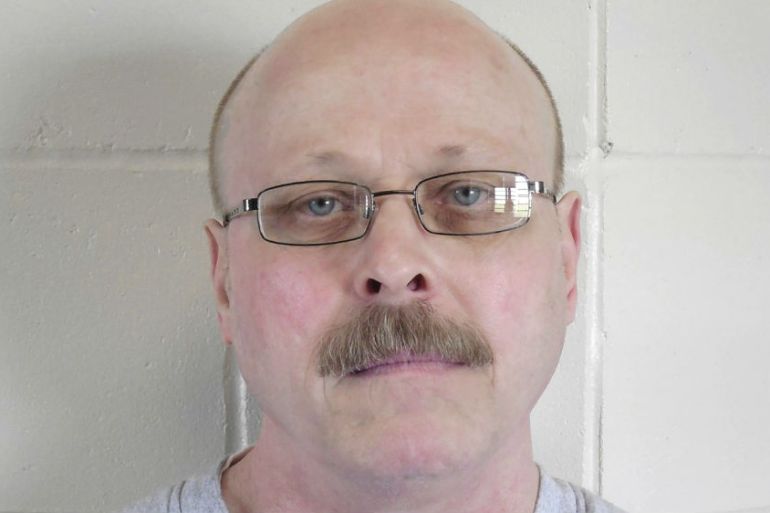Nebraska carries out first US execution using opioid fentanyl
Three of the four substances used in Carey Dean Moore’s execution had never been used in lethal injections in the state.

Nebraska has carried out its first execution in more than two decades with a drug combination never tried before, including the first use of the powerful opioid fentanyl, which has become the focal point in the United States’ opioid crisis.
Carey Dean Moore was pronounced dead at 10:47am local time (15:47 GMT) on Tuesday. The 60-year-old had been sentenced to death for killing two cab drivers in Omaha in 1979. He was the first inmate to be lethally injected in Nebraska, which last carried out an execution in 1997, using the electric chair.
Keep reading
list of 4 itemsRecord number of people executed for drug offences in 2023
Executions in Iran hit 8-year high in 2023
Australian writer Yang Hengjun sentenced to death on China spy charges
Witnesses said that there appeared to be no complications in the execution process, which also was the first time a state used four drugs in combination.
At one point while on the gurney, Moore turned his head and mouthed several words to his family, including “I love you.”
In his final written statement, Moore admitted: “I am guilty.” But he said there are others on Nebraska’s death row who he believes are innocent and he said they should be released.
“How might you feel if your loved one was innocent and on death row?” Moore asked.
Tuesday’s execution comes a little more than three years after Nebraska politicians abolished the death penalty, only to have it reinstated the following year through a citizen ballot drive partially financed by Republican Governor Pete Ricketts. The governor, a wealthy former businessman, has said he was fulfilling the wishes of voters in the conservative state.
“We’re sick of hearing about Carey Dean Moore,” Steve Helgeland, the son of one of Moore’s victims, said in advance of the execution.
Danielle Conrad, the director of the American Civil Liberties Union – Nebraska, said in a statement on Twitter that Moore’s execution is the “most recent dark chapter in the state’s troubled history with the death penalty”.
Use of fentanyl
Three of the four substances used in Tuesday’s execution had never been used for lethal injections – underscoring the difficulty states across the US have had in obtaining previously employed execution drugs.
The Nebraska drug protocol called for an initial IV dose of diazepam, commonly known as Valium, to render the inmate unconscious, followed by the powerful synthetic opioid fentanyl, then cisatracurium besylate to induce paralysis and stop the inmate from breathing and potassium chloride to stop the heart.
Fentanyl has been one of the main drivers of the opioid epidemic, which has gripped the country in recent years. According to the National Institute on Drug Abuse, more than 115 people die each day in the US after overdosing on opioids, including heroin, prescription painkillers and fentanyl.
After each injection in Moore’s execution, prison officials sent saline through the IV to flush out any residue and ensure all the drugs had entered his system.
Diazepam and cisatracurium also had never been used in executions before.
Legal challenges
Moore had faced execution dates set by the Nebraska Supreme Court seven times since he was convicted, but each was delayed because of legal challenges and questions over whether previous lethal injection drugs were purchased legally.
The most recent challenge came last week after a German-based drugmaker tried to halt the execution by filing a lawsuit that alleged the state had illegally procured at least one of the company’s drugs.
The company, Fresenius Kabi, argued that allowing the execution to go forward would harm its reputation and business relationships.
But a federal judge sided with state attorneys, who argued that the public’s interest in carrying out a lawful execution outweighed the company’s concerns. The judge also noted that Moore had stopped fighting the state’s efforts to execute him.
A federal appeals court upheld that ruling Monday, and Fresenius Kabi decided not to take the issue to the US Supreme Court.
Harder to get drugs
In recent years, states have had to find alternative means to carry out executions due to a number of lawsuits by pharmaceutical companies that blocked their drugs from being used.
Oklahoma announced earlier this year it would begin using nitrogen gas to carry out its executions.
“We can no longer sit on the sidelines and wait to find drugs,” Oklahoma Attorney General Mike Hunter said at the time.
Mississippi and Alabama have also passed legislation that would allow for asphyxiation with nitrogen gas if lethal injection drugs are not available.
According to the Death Penalty Information Center, 31 states, the federal government and US military allow for capital punishment. The centre has documented at least 1,481 executions in the country since 1976. The majority of those – at least 1,305 – were carried out by lethal injection, the centre said.